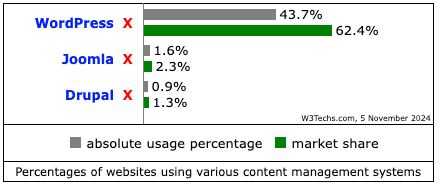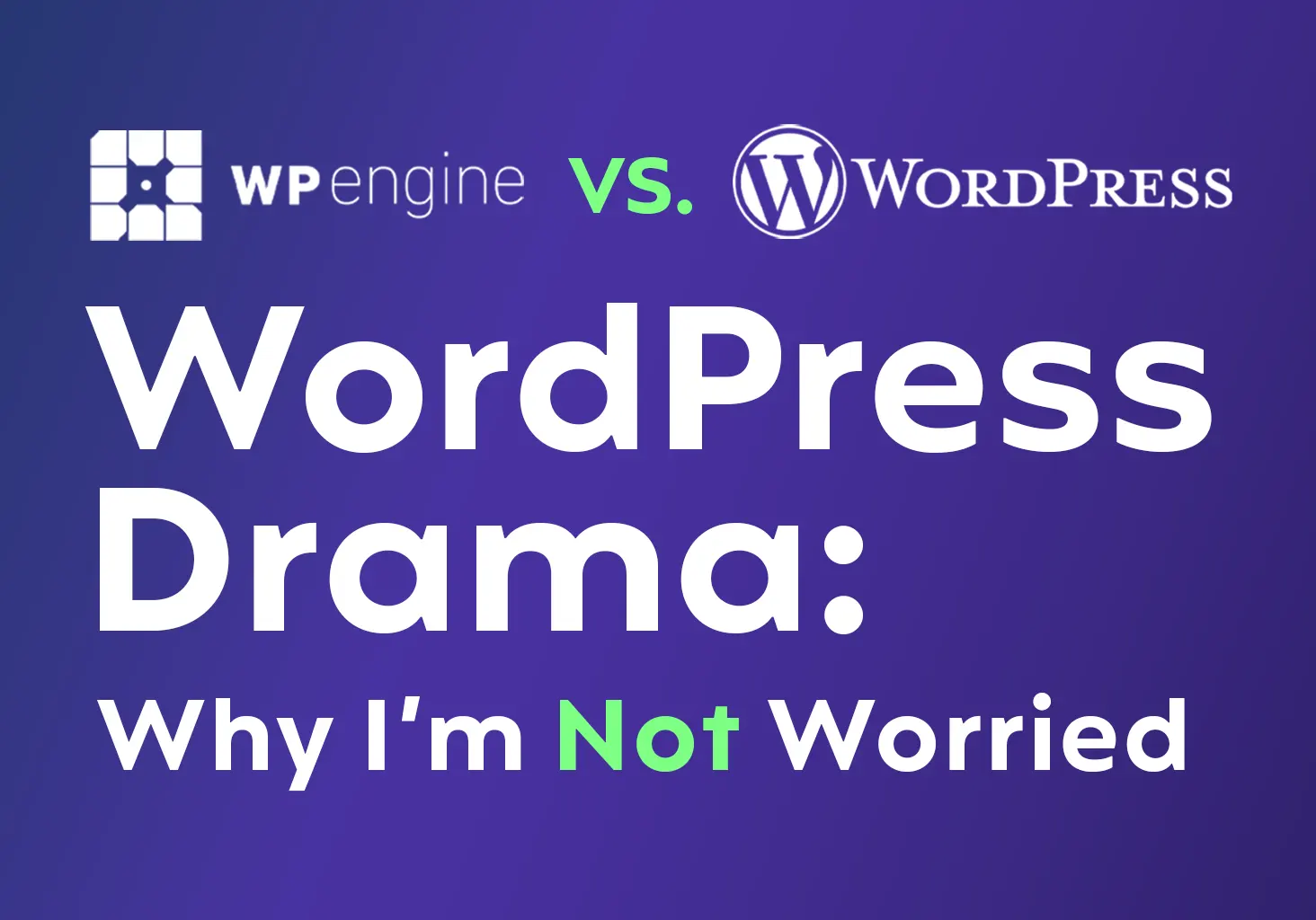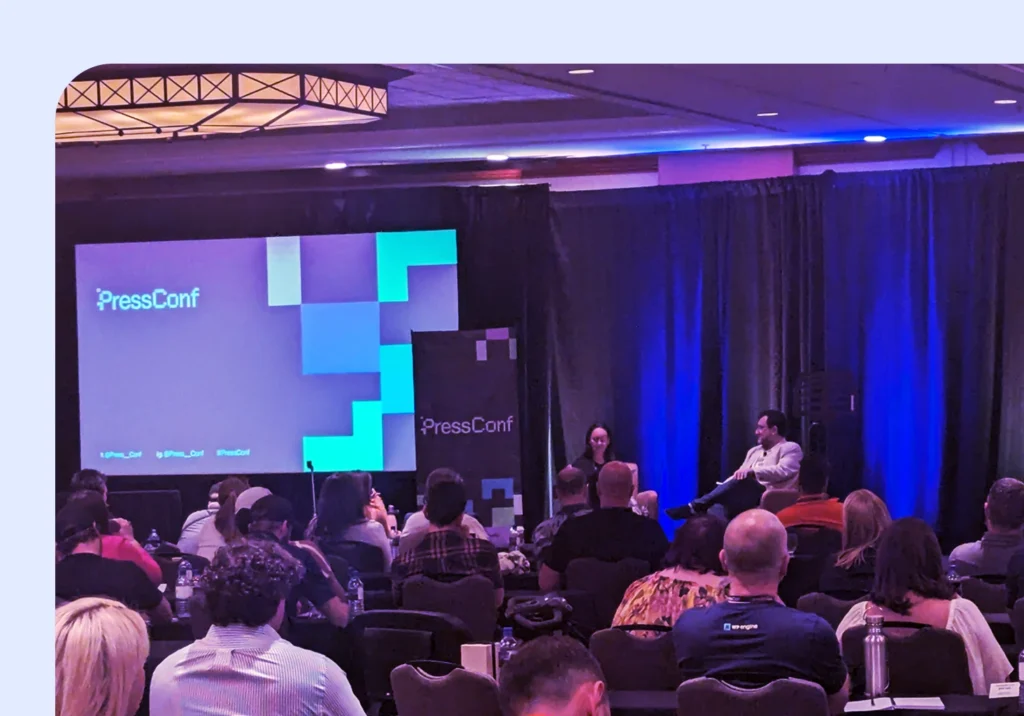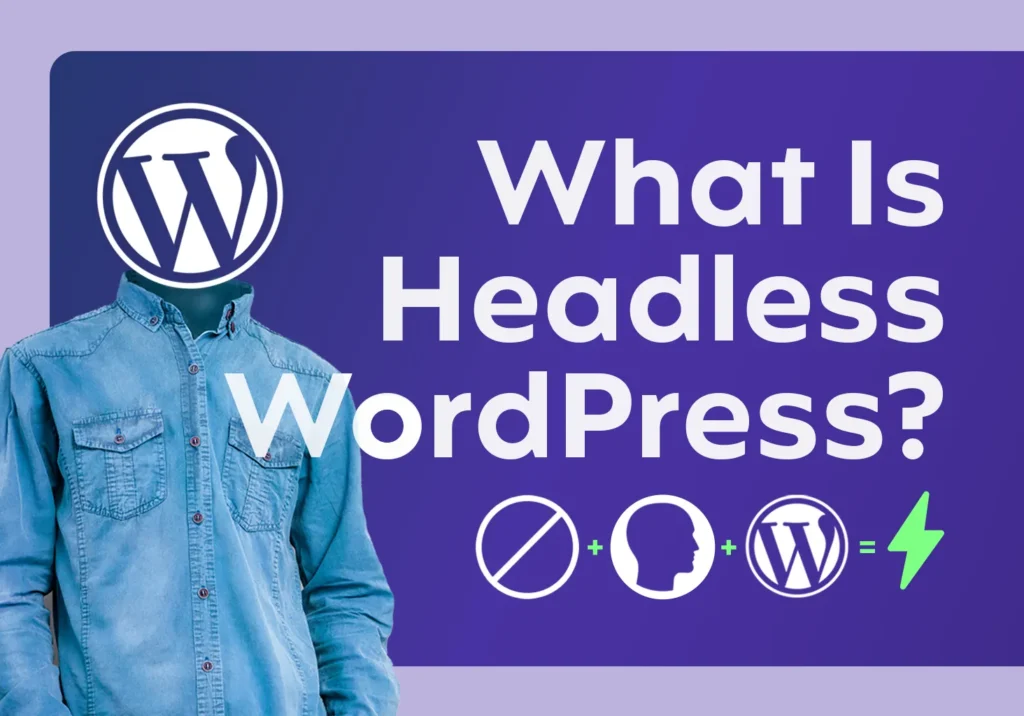Updated July 30, 2025
An early WordPress adopter answers: “What’s happening with WordPress?”
If you’ve been following the “WordPress drama,” this will ring a bell. If not, watch this video for a detailed breakdown. Here’s a quick version (and timeline) to catch you up to speed:
WordPress, which started back in 2003 as a fork of b2/cafelog, is an open-source content management system (CMS) that powers a substantial portion of the internet. I first used it in 2005 for my blog. Back then, there just wasn’t anything else quite like it. It was groundbreaking to have a CMS that was free, open-source, and straightforward for basic blogging. It was (and continues to be) a game-changer for me and many other adopters.
Fast-forward to today, and WordPress powers over 43% of all websites globally. Depending on how you slice the data, it could be as high as 62.4% when looking at sites using a content management system (CMS). That kind of dominance didn’t happen overnight – it’s the result of almost two decades of steady growth and engaged community support.
Navigating Open-Source Ethics: Where Do Rights Begin?
But that momentum hit some turbulence in September 2024.
Matt Mullenweg, founder of Automattic (the company behind WordPress.com and a major WordPress.org contributor), has challenged WP Engine, one of the largest managed WordPress hosting providers. While everyone in the industry has used the term “managed WordPress” for years, Automattic is making moves to trademark this phrase. Beyond the trademark issue, Mullenweg argues that WP Engine isn’t contributing enough to the open-source ecosystem and is demanding they pay 8% of their revenue as ongoing compensation.
This move from Matt is undoubtedly a bold one, and it’s sparked a lot of debate for those who have been around since the start. Count me as one of them. However, at the heart of it, this boils down to whether WP Engine is doing enough to support the very platform it profits from, and how much of that should be required for an open-source tool.
In response to these perceived shortcomings, Matt has taken significant steps to push back against WP Engine and its affiliates, creating ripples across the ecosystem.
Quick Timeline of Events [Full Version Below]
- Trademark Usage: Automattic alleges that WP Engine’s use of the “WordPress” name violates trademark guidelines, potentially causing consumer confusion.
- Open-Source Contributions: Mullenweg criticizes WP Engine for not contributing adequately to the WordPress open-source project, despite profiting from the platform.
- Control Over Resources: The dispute has led to WP Engine being blocked from accessing WordPress.org resources, affecting its customers’ ability to update plugins and themes. WP Engine filed an Injunction for Temporary Relief while things progress through the court system.
This situation is unprecedented and concerning, but it’s also manageable. My team and I are paying close attention to how this affects the WordPress community. While I’d love to see WP Engine contribute more to the open-source community, Automattic’s approach has been problemattic (pun intended) to say the least. It raises bigger questions about leadership and control in the WordPress community.
Why I’m Not Worried (and You Shouldn’t Be Either)
With all that said, I’m really not worried, and nobody using WordPress needs to be worried either. WordPress is everywhere – literally. Its market share is so massive that even a significant shift wouldn’t knock it off its perch.
Sure, there’s talk about the platform splitting or losing momentum, but let’s put that into perspective with what we already know: WordPress accounts for 43.7% of all websites and 62.4% of those using a CMS. Even if half the market walked away tomorrow (which isn’t happening), it would still be the dominant platform. And probably by a long shot.

Another reason to be optimistic: change is part of the DNA of this industry. I’ve been building websites since 1996, and one thing has remained constant – absolutely nothing stays the same. Trends evolve, technologies shift, and platforms rise and fall. WordPress has survived licensing changes, competitors like Movable Type, and countless other challenges. This tiff with WP Engine is just another bump in the road, as far as I can tell.
That being said, my team and I are staying alert to changes while focusing on the big-picture goal: building and maintaining great websites for our clients, regardless of how the tools may shift. The digital landscape never stands still, but WordPress isn’t going anywhere anytime soon, and neither are we.
————————–
TIMELINE OF EVENTS
- September 21, 2024: Matt Mullenweg publicly criticizes WP Engine on stage at WordCamp US, labeling the company a “cancer to WordPress” and urging the community to switch providers. He accuses WP Engine of insufficient contributions to the WordPress open-source project and improper use of the WordPress trademark. TechCrunch
- September 23, 2024: WP Engine issues a cease-and-desist letter to Automattic, alleging defamation and extortion. The company claims that Automattic demanded a significant percentage of its gross revenues as trademark licensing fees. TechCrunch
- September 25, 2024: Automattic responds with its own cease-and-desist letter, accusing WP Engine of infringing on the WordPress trademark. Subsequently, WordPress.org bans WP Engine from accessing its resources, including plugins and themes, impacting WP Engine customers’ ability to update these components. TechCrunch
- September 27, 2024: WordPress.org temporarily lifts the ban on WP Engine until October 1, allowing the company time to build its own mirror sites for necessary resources. TechCrunch
- October 2, 2024: WP Engine files a lawsuit against Automattic and Matt Mullenweg, alleging libel, slander, and violation of the Computer Fraud and Abuse Act. The lawsuit contends that Automattic’s actions were an abuse of power and aimed at harming WP Engine’s business. The Verge
- October 4, 2024: Automattic makes its first buyout offer, providing severance packages for employees unwilling to support Mullenweg’s stance on WP Engine. A reported 159 employees accepted the offer. TechCrunch
- October 12, 2024: WordPress.org takes control WP Engine’s Advanced Custom Fields (ACF) plugin listing, replacing it with a forked version named “Secure Custom Fields,” citing unspecified security concerns. Wikipedia
- October 17, 2024: Automattic offers a second buyout opportunity to employees who disagree with Mullenweg’s stance on the WP Engine conflict, providing nine months’ pay for those choosing to resign. The Verge
- October 18, 2024: WP Engine requests a temporary Injunction for relief from Automattic’s actions. WPTavern
- October 31, 2024: Matt Mullenweg and Automattic request the court to dismiss WP Engine’s lawsuit, arguing that WP Engine has no legal rights to WordPress.org’s free services and that their claims lack legal basis. The Verge
- November 7, 2024: Automattic launches a website tracking the number of customers leaving WP Engine amid the feud. The site includes a detailed report of websites that have migrated away. TechCrunch
- November 26, 2024: At the injunction hearing, the judge expresses an inclination to grant relief, requiring both sides to submit more specific proposed terms. WPTavern
- December 10, 2024: In a preliminary injunction, the judge ruled in favor of WP Engine. The injunction requires Automattic to stop blocking WP Engine from accessing WordPress.org resources. In addition, the judge specified that Automattic had to stop interfering with WP Engine’s plugins. The Verge
- January 11, 2025: Matt Mullenweg publishes the “Joost/Karim Fork” post, challenging Joost de Valk and Karim Marucchi to create a WordPress fork after they called for governance changes within WordPress. While both say they weren’t proposing a fork, Mullenweg deactivates their WordPress.org accounts along with Sé Reed, Heather Burns, and Morten Rand-Hendriksen, encouraging them to pursue their alternative vision. WP-Content.co
Recent Developments
When we first published this post in late 2024, WP Engine had just scored a significant win early in this legal process (see timeline). Resolution on the lawsuit will likely take a year or more to finalize and we will continue with updates as the case proceeds.
In January 2025, Matt Mullenweg escalated tensions by deactivating WordPress.org accounts for contributors who called for governance changes, challenging them to create their own fork.
July 2025 Update [Most Recent]
The legal situation has stayed mostly quiet since our last update. Both companies continue operating normally, except for Automattic’s notable April restructuring that eliminated 280 jobs – about 16% of their workforce. Keep in mind this was after they lost 8% of their team in the buyout opportunities in October of 2024 (see timeline above).
On a positive note, the WordPress community keeps adapting. Independent conferences like PressConf are thriving (I spoke there recently), and the community continues speaking out and exploring alternatives that reduce dependence on any single organization’s infrastructure.
My team and I will continue sharing updates here and over on my YouTube channel as they unfold. If you have any questions or want to discuss how this might impact your WordPress site, feel free to reach out. We’re always happy to find time to chat!




